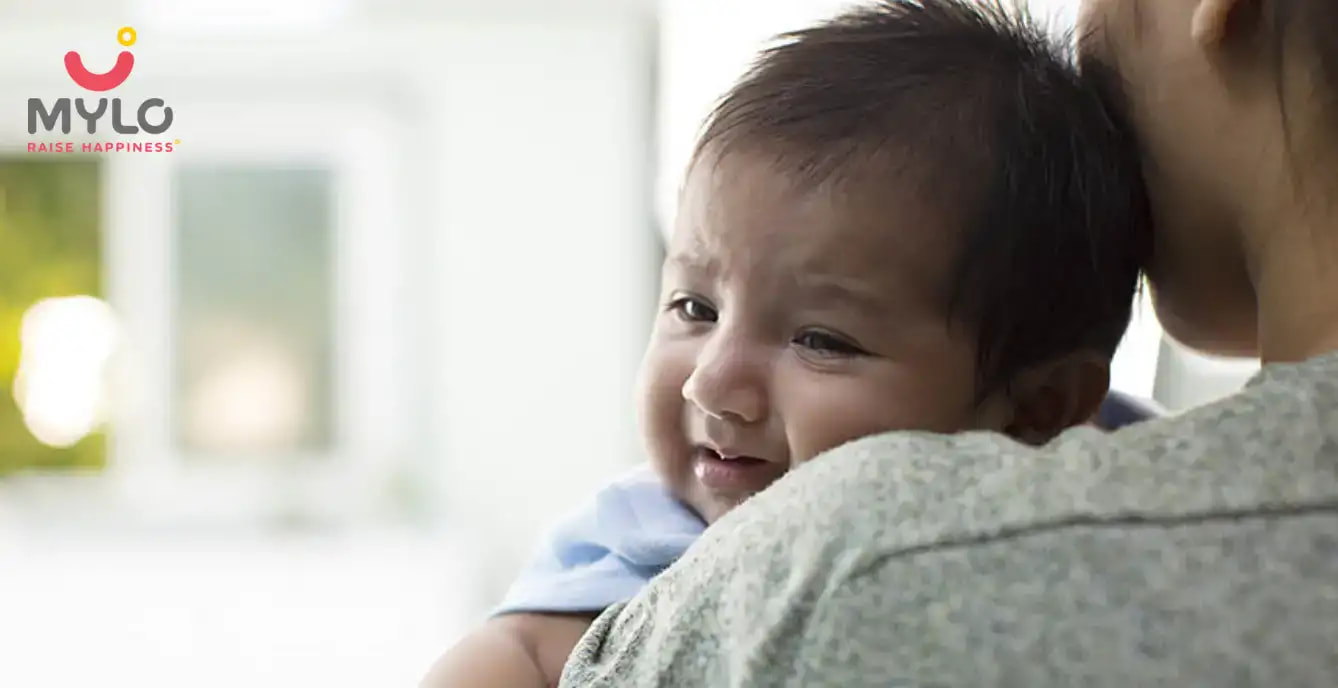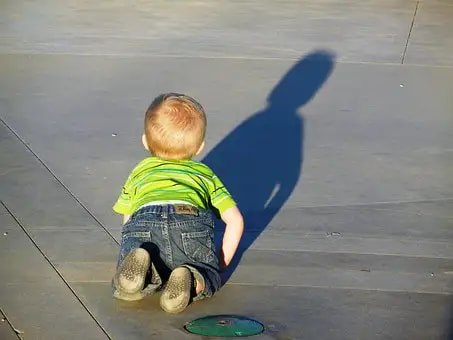Home

How to Know If Your Toddler Has Worms in Stomach?
In this Article

Safety & Care
How to Know If Your Toddler Has Worms in Stomach?
Updated on 3 November 2023



Medically Reviewed by
Dt. Mansi Goyal
Specializes in Critical Gestational Diabetes, PCOS Patients - BSC| MSC (Home Science, Food & Nutrition)
View Profile

As a mother, the last thing you want to deal with is your baby's body being invaded by worms. But it's common for children to contract worm infections. The worms reside in the intestine of your baby, and their survival depends upon the child's diet. Hence, it becomes necessary to be educated about the types of worms that can make a home in your baby's body, what these worms can do there, how your baby got these worms, and how you can bid goodbye to these parasites.
Types of Worm Infections
Worms that make their home in children can be of different types. Some of the most common types of worms that infect babies are:
1. Tapeworms
Hooks and suckers on the end of tapeworms allow them to cling to the intestines and reproduce on partially digested food. The majority of the time, children ingest them through contaminated food.
2. Roundworms
Roundworm infection is caused by a worm, which can be found in the soil. They have a hollow form and can grow to be 35 cm in length if left unattended. Roundworms can be found in saltwater, soil, and fresh water.
3. Hookworms
Hookworms are most commonly associated with poor sanitation. It is these worms that attach themselves to the gut walls that are causing the problem. When a youngster comes into contact with contaminated dirt, they may get a hookworm infection.
What are the Signs and Symptoms of a Worm Infection?
Most of the time, worm infections do not exhibit symptoms, and even if they do, they are so small that they are often ignored. However, here are a few signs and symptoms that your child may show if they have a worm infection:
-
Weight loss
-
Vomiting
-
Lack of sleep
-
Bowel issues
-
Constipation
-
Stomach pain
-
Diarrhoea
-
Abdominal pain
-
Itching or pain around the anus area
-
Blood in the stool
-
Foul-smelling stools
-
Tiredness
-
Gastric issues
-
Anxiety
-
Loss in Appetite
Home Remedies for a Worm Infection
If your child has a worm infection, you should consult a doctor as soon as possible. You can also puree the following ingredients in your child's diet:
-
Garlic
-
Pumpkin seeds
-
Unripe papaya
-
Bitter Gourd
-
Neem
-
Carom seeds
-
Turmeric
-
Carrots
-
Coconut
-
Cloves
What are the effects of worms on your baby's growth?
-
Worms cause the loss of iron and protein in the body, which frequently results in anemia in children.
-
The presence of roundworms results in inadequate nutrition absorption.
-
Hunger, a decrease in food intake, and weakness are all symptoms of worm infestation.
-
Diarrhoea and dysentery in infants and toddlers are also caused by these pathogens.
-
In the long term, if these worm infections aren't detected and treated, they can burn the immune system of your child and harm your baby's intellectual and physical development.
How to prevent worm infections in children?
Worms can spread easily and infect your child from time to time. It's important for you and your baby to learn how to prevent worm infections. Here are some precautions you must take to prevent the spread of worms:
-
Teach your child to always wash hands after going to the bathroom and before eating food.
-
Cut your child's fingernails regularly.
-
Encourage your child to not suck on their thumbs or fingers.
-
Instruct your child to never scratch their bottom or pick their nose.
-
Clean toilet seats and potty seats regularly.
-
Encourage your child to bathe every day.
-
Regularly wash your child's clothes and linen in soapy water for several days after they catch a worm infection.
Closing Thoughts
If you suspect your child has a worm infection, it's best to see a doctor immediately. Worm infections are easy to treat if detected early and cause little or no damage. You should avoid sending your child to school while they have worms to prevent the spread of infection in other kids. Teaching your child the importance of personal hygiene is the best prevention for worm infections.





Medically Reviewed by
Dt. Mansi Goyal
Specializes in Critical Gestational Diabetes, PCOS Patients - BSC| MSC (Home Science, Food & Nutrition)
View Profile


Written by
Mittali Khurana
Mittali is a content writer by profession. She is a dynamic writer with 04+ years of experience in content writing for E-commerce, Parenting App & Websites, SEO.
Read MoreGet baby's diet chart, and growth tips

Related Articles
Related Topics
RECENTLY PUBLISHED ARTICLES
our most recent articles

Diet & Nutrition
গর্ভাবস্থায় আলুবোখরা: উপকারিতা ও ঝুঁকি | Prunes During Pregnancy: Benefits & Risks in Bengali

Diet & Nutrition
গর্ভাবস্থায় হিং | ঝুঁকি, সুবিধা এবং অন্যান্য চিকিৎসা | Hing During Pregnancy | Risks, Benefits & Other Treatments in Bengali

Women Specific Issues
স্তনের উপর সাদা দাগ: লক্ষণ, কারণ এবং চিকিৎসা | White Spots on Nipple: Causes, Symptoms, and Treatments in Bengali

Diet & Nutrition
গর্ভাবস্থায় পোহা: উপকারিতা, ধরণ এবং রেসিপি | Poha During Pregnancy: Benefits, Types & Recipes in Bengali

Diet & Nutrition
গর্ভাবস্থায় মাছ: উপকারিতা এবং ঝুঁকি | Fish In Pregnancy: Benefits and Risks in Bengali

Diet & Nutrition
গর্ভাবস্থায় রেড ওয়াইন: পার্শ্ব প্রতিক্রিয়া এবং নির্দেশিকা | Red Wine During Pregnancy: Side Effects & Guidelines in Bengali
- ইনার থাই চ্যাফিং: কারণ, উপসর্গ এবং চিকিৎসা | Inner Thigh Chafing: Causes, Symptoms & Treatment in Bengali
- গর্ভাবস্থায় ব্রাউন রাইস: উপকারিতা ও সতর্কতা | Brown Rice During Pregnancy: Benefits & Precautions in Bengali
- Velamentous Cord Insertion - Precautions, Results & Safety
- Unlock the Secret to Flawless Skin: 7 Must-Have Qualities in a Face Serum
- Unlock the Secret to Radiant Skin: How Vitamin C Serum Can Transform Your Complexion
- Gender No Bar: 10 Reasons Why Everyone Needs a Body Lotion
- Unlock the Secret to Radiant Skin How to Choose the Perfect Body Lotion for Your Skin Type
- Top 10 Reasons to Apply a Body Lotion After Every Bath
- Communication in Toddlers: Milestones & Activities
- How to Improve Vocabulary for Toddlers?
- A Comprehensive Guide to Understanding Placenta Accreta
- Vulvovaginitis in Toddlers Causes, Symptoms and Treatment
- A Comprehensive Guide to Understanding Cerebral Palsy in Children
- Bitter Taste in Mouth During Pregnancy: Understanding the Causes and Remedies


AWARDS AND RECOGNITION

Mylo wins Forbes D2C Disruptor award

Mylo wins The Economic Times Promising Brands 2022
AS SEEN IN

- Mylo Care: Effective and science-backed personal care and wellness solutions for a joyful you.
- Mylo Baby: Science-backed, gentle and effective personal care & hygiene range for your little one.
- Mylo Community: Trusted and empathetic community of 10mn+ parents and experts.
Product Categories
baby carrier | baby soap | baby wipes | stretch marks cream | baby cream | baby shampoo | baby massage oil | baby hair oil | stretch marks oil | baby body wash | baby powder | baby lotion | diaper rash cream | newborn diapers | teether | baby kajal | baby diapers | cloth diapers |








